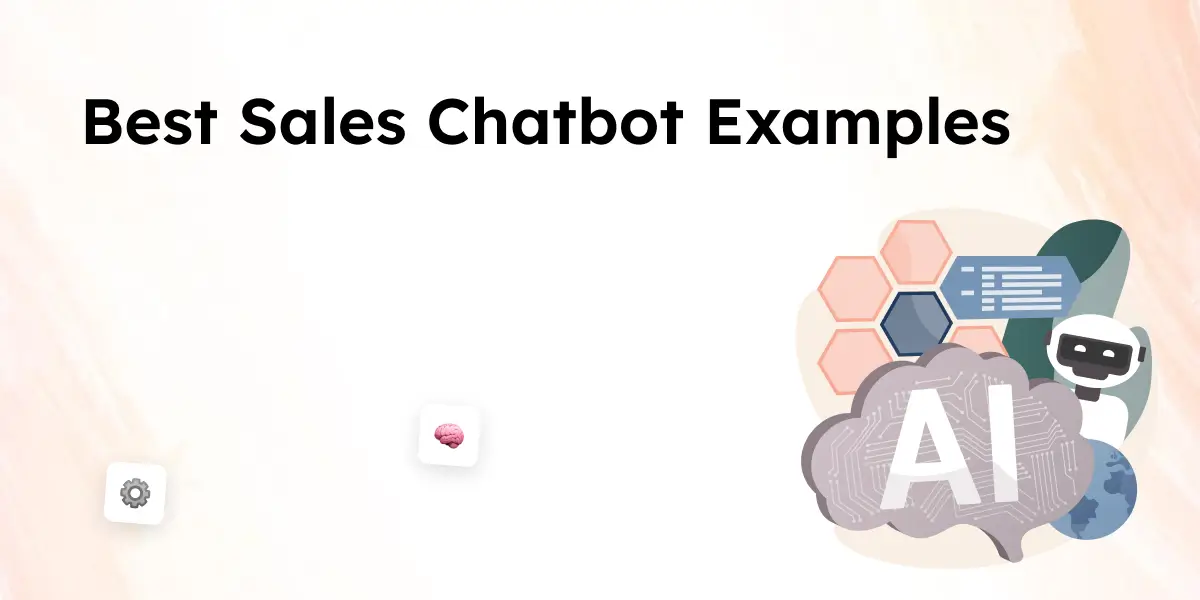Chatbots are transforming the sales process by automating tasks, enhancing customer engagement, and helping businesses increase conversion rates. These AI-powered tools assist with lead qualification, live chat, and customer support while providing instant, personalized responses.
Companies using chatbots for sales and marketing see higher revenue and improved customer satisfaction. This guide explores how sales bots work, the best chatbot examples, and how businesses can integrate them to streamline sales and boost revenue.
How Do Sales Chatbots Work?
A sales chatbot is a tool designed to automate interactions with potential customers and assist in the sales process. These bots can handle everything from answering FAQs to guiding users through product selections and even completing transactions. With AI and machine learning, chatbots analyze user behavior and personalize responses to increase conversion rates.
Types of Chatbots Used in Sales
There are two main types of chatbots used in sales:
- Rule-based chatbot – These bots follow pre-programmed conversation flows. They are useful for answering common customer inquiries and guiding users through structured processes.
- AI-powered chatbot – These bots use artificial intelligence, natural language processing, and machine learning to engage customers in dynamic, personalized conversations. They can learn from interactions and improve over time.
How Sales Bots Work to Increase Sales
Sales chatbots streamline the sales process by automating lead qualification, answering customer questions, and nudging users through the sales funnel. Here’s how they help businesses drive sales:
- Lead qualification – Chatbots analyze user responses to determine if they are a potential customer. They gather relevant information before handing off qualified leads to a sales rep.
- Customer engagement – AI bots keep conversations active, provide product recommendations, and answer questions in real time, increasing customer satisfaction.
- Sales automation – Businesses use chatbots to automate follow-ups, schedule meetings, and handle transactions, reducing the burden on the sales team.
- 24/7 customer support – Chatbots work around the clock, ensuring that businesses never miss an opportunity to close a sale.
Many chatbot platforms allow businesses to customize their bots to fit their specific sales strategy. With the right chatbot technology, companies can provide sales support, increase customer satisfaction, and generate more revenue. Sales chatbots work best when integrated with lead generation strategies that qualify and segment potential buyers. Learn how chatbot-powered lead generation enhances the sales funnel.
Benefits of Using Chatbots for Sales and Marketing
Businesses use chatbots to automate tasks, improve customer engagement, and increase sales. These bots play a key role in streamlining the sales process and improving the overall customer experience. Here are the top benefits of integrating chatbots into your sales and marketing strategy.
1. Increase Sales with 24/7 Availability
Sales chatbots work around the clock, ensuring potential customers receive instant responses at any time. Unlike a sales rep who works specific hours, chatbots for sales provide continuous support, reducing response times and increasing conversion rates.
2. Improve Lead Generation and Qualification
AI chatbots assist in lead generation by collecting user data and qualifying leads based on customer responses. Businesses can use chatbots to identify high-intent buyers and pass them to the sales team for further engagement. This streamlines the sales funnel and ensures that sales reps focus on the best possible leads.
3. Personalize Customer Interactions
Chatbots use AI and machine learning to personalize recommendations based on a user’s preferences and behavior. Businesses that use AI chatbots can enhance their sales process and improve customer satisfaction by providing tailored product suggestions and solutions.
4. Reduce Workload for Sales and Customer Support Teams
Sales chatbots help businesses by handling repetitive inquiries, freeing up human agents to focus on complex tasks. This reduces customer service costs while improving efficiency. Many chatbot solutions also integrate with CRM systems, making it easy for sales reps to track conversations and follow up when necessary.
5. Boost Customer Engagement and Satisfaction
Chatbots analyze customer behavior to offer personalized assistance, helping users navigate the sales process effortlessly. With features like live chat and conversational AI, chatbots can also improve user experience by providing fast, accurate responses.
6. Enhance Sales Automation and Marketing Efforts
Businesses use artificial intelligence in chatbots to automate upselling, cross-selling, and follow-ups. AI-powered chatbots also use pre-programmed conversation flows to guide customers through purchases. When paired with a strong marketing and sales strategy, chatbots can increase revenue and maximize efficiency.
7. Integrate Seamlessly with Sales Tools
Many chatbot platforms integrate with CRM systems, payment gateways, and analytics tools. This helps businesses track performance, optimize chatbot use, and improve their sales strategy. Companies can also use chatbot builders to customize bots for specific business needs.
7 Best Sales Chatbot Examples to Drive Sales
Sales chatbots are transforming how businesses interact with customers, automate lead qualification, and increase sales. Here are seven of the best chatbot examples that show how AI-powered bots help businesses improve their sales process and customer engagement.
1. HubSpot’s Chatbot – Lead Qualification and Scheduling
HubSpot’s chatbot is a powerful tool that helps businesses streamline their sales funnel by automating lead generation. It collects customer data, qualifies leads, and schedules meetings with sales reps. This bot for sales integrates with HubSpot’s CRM, ensuring that businesses get the best possible results when managing customer interactions.
2. H&M’s Digital Stylist Bot – Personalized Shopping Assistant
H&M uses AI chatbots to enhance the shopping experience by personalizing product recommendations. The chatbot interacts with customers, suggests outfits based on preferences, and guides users through the purchase process. This sales bot improves conversion rates by making shopping more interactive and engaging.
3. Sephora’s Virtual Artist – AI-Powered Beauty Advisor
Sephora’s chatbot uses artificial intelligence and machine learning to provide personalized beauty recommendations. Customers can try on different makeup looks virtually before purchasing. This chatbot solution increases customer satisfaction and boosts sales by offering a more personalized shopping experience.
4. Pizza Hut’s Ordering Bot – Simplified Food Ordering
Pizza Hut’s chatbot helps customers place orders directly through messaging platforms. It personalizes menu recommendations, provides real-time order tracking, and offers promotional deals. This chatbot technology improves the sales process and helps businesses increase revenue by making ordering convenient.
5. Domino’s Chatbot – AI-Driven Customer Service and Sales
Domino’s chatbot enhances the customer experience by allowing users to place and track orders through AI-powered automation. This chatbot for sales reduces friction in the buying process, making transactions quicker and more efficient.
6. Subway’s RCS Bot – Engaging Customers with Promotions
Subway’s chatbot leverages rich communication services (RCS) to send promotions, answer customer queries, and facilitate orders. This AI chatbot helps businesses use chatbots effectively to drive sales and improve customer engagement.
7. Luxury Escapes’ Chatbot – Smart Travel Sales Automation
Luxury Escapes’ chatbot helps potential customers find and book holiday packages by using AI-powered recommendations. This bot for sales streamlines the booking process, enhances user experience, and increases conversion rates by providing tailored travel suggestions.
These chatbot examples demonstrate how businesses use chatbots to increase sales, improve lead qualification, and enhance customer satisfaction. Whether you need a chatbot for sales automation, customer support, or lead generation, choosing the best chatbot platform can help your business grow.
How to Use Chatbots for Your Business to Increase Sales
Businesses looking to increase sales and improve customer engagement can benefit from integrating chatbots into their sales process. Here’s how you can use chatbots for sales and marketing effectively.
1. Build Your First Chatbot for Sales Automation
To get started, businesses can use a chatbot builder or a no-code chatbot builder to create a custom chatbot. These tools allow companies to develop AI-powered chatbots that interact with potential customers, answer FAQs, and guide users through the sales funnel. The chatbot market offers many chatbot platforms that provide easy-to-use chatbot tools for beginners.
2. Choose the Best Chatbot for Your Business Needs
When selecting a chatbot solution, businesses should consider:
- Types of chatbots: AI-powered chatbots vs. rule-based chatbots.
- Chatbot features: Personalization, chatbot analytics, and CRM integration.
- Chatbot companies: Options like HubSpot, Drift, and Intercom.
A chatbot that aligns with your sales strategy and marketing goals can help businesses increase conversion rates and streamline sales automation.
3. Integrate Your Chatbot with Sales and Marketing Tools
To enhance your sales process, businesses should integrate chatbots with:
- CRM software – To track customer interactions.
- Live chat – To provide instant customer support.
- Sales and marketing platforms – To optimize chatbot use for lead qualification.
AI-powered chatbots work best when they are connected to the right sales and marketing systems.
4. Use AI Chatbots to Personalize the Customer Experience
AI bots can analyze customer behavior and personalize recommendations to increase sales. Businesses that use AI chatbots for sales can improve customer engagement by tailoring responses and guiding users toward the best possible purchasing decisions.
5. Train and Optimize Your Chatbot for Sales Success
Chatbots can be used to automate many aspects of sales, but they need ongoing optimization. Businesses should:
- Use pre-programmed conversation flows to guide potential customers.
- Analyze chatbot statistics to identify areas for improvement.
- Update chatbot technology to ensure the chatbot works efficiently.
6. Best Practices for Chatbot Use in Sales
To get the best results, businesses should follow these best practices:
- Ensure chatbots answer FAQs accurately.
- Use artificial intelligence to enhance conversational AI.
- Provide a smooth chatbot user experience.
- Monitor chatbot performance and customer satisfaction.
By implementing the right chatbot solution, businesses can streamline their sales process and improve overall efficiency. Whether you are using chatbots for sales support, lead qualification, or customer service, the right chatbot technology can help your business increase revenue and drive sales.
Future of Chatbots in Sales and Marketing
Chatbots are playing an increasingly important role in sales and marketing, and their influence will continue to grow as AI technology advances. Businesses that use chatbots can expect improved efficiency, higher customer satisfaction, and increased revenue. Here’s what the future holds for sales chatbots.
1. Growth of the Chatbot Market
The chatbot market is expanding rapidly as businesses recognize the value of automation. More companies are investing in chatbot solutions to streamline their sales process and improve customer engagement. AI-powered chatbot adoption is rising in industries such as eCommerce, SaaS, and financial services.
2. AI and Machine Learning Will Improve Chatbot Capabilities
AI chatbots are becoming more intelligent thanks to machine learning and natural language processing. Future chatbots will analyze customer data more effectively, personalize recommendations, and provide more human-like interactions. Businesses will use AI to refine chatbots, ensuring better sales automation and lead qualification.
3. Increased Personalization in Sales and Marketing
AI bots will enhance the sales process by personalizing interactions based on user preferences. Chatbots can be used to deliver customized promotions, product recommendations, and targeted marketing messages, helping businesses increase conversion rates.
4. Chatbots Will Become Essential for Sales Teams
Many chatbot companies are focusing on creating chatbots that work alongside sales teams. A chatbot for sales will handle initial inquiries, filter leads, and assist in customer support, allowing sales reps to focus on closing deals. This integration will help businesses streamline their sales process and improve overall productivity.
5. More Businesses Will Use AI Chatbots for Customer Service
As chatbot technology improves, businesses will rely more on AI-powered chatbot solutions for customer service. Chatbots answer FAQs, provide 24/7 support, and ensure a seamless experience for potential customers.
6. Conversational AI Will Drive More Sales
The future of sales bots involves more advanced conversational AI. Businesses will use artificial intelligence to create bots that engage users in natural, meaningful conversations. This will make chatbot interactions more effective in driving sales.
7. The Rise of No-Code Chatbot Builders
More businesses will adopt no-code chatbot builder platforms, making chatbot development accessible to non-technical teams. This shift will allow small and medium-sized businesses to implement chatbot solutions without extensive development costs.
FAQs About Sales Chatbots
Do chatbots really help increase sales?
Yes, chatbots can be used to increase sales by automating lead qualification, providing real-time support, and guiding users through the sales funnel. Chatbots help businesses improve conversion rates by engaging customers instantly and offering personalized recommendations.
How can chatbots improve customer engagement?
Chatbots analyze customer behavior and use pre-programmed conversation flows to provide relevant information. AI bots interact with customers in real-time, keeping them engaged and assisting them throughout the buying process.
What’s the difference between a sales bot and a customer service chatbot?
A sales bot is designed to drive sales by assisting with lead qualification, product recommendations, and transactions. A customer service chatbot focuses on answering FAQs and resolving support inquiries. Businesses often use chatbots for both sales and customer support.
Can small businesses use chatbots for sales?
Yes, many chatbot platforms offer no-code chatbot builders, making it easy for small businesses to implement AI-powered chatbots without technical expertise. A chatbot can be customized to handle sales, support, and marketing tasks efficiently.
Conclusion
Chatbots are transforming sales and marketing by automating tasks, improving lead qualification, and increasing sales. Businesses that invest in chatbot technology can enhance their sales process and improve customer satisfaction.
Using a chatbot can help businesses reduce the workload on sales teams, provide 24/7 customer support, and increase revenue by improving conversion rates. Whether you’re looking for a chatbot for sales or customer service, choosing the right chatbot platform can make a significant difference.
Businesses that want to streamline their sales process and improve efficiency should consider implementing AI-powered chatbot solutions. With continuous advancements in AI and machine learning, chatbots will become even more powerful in driving sales and enhancing customer experiences.



